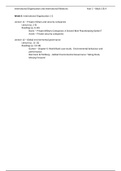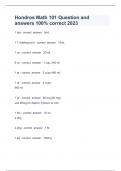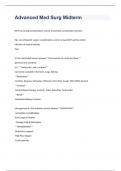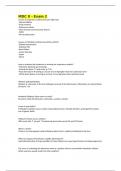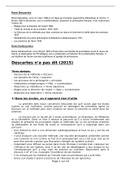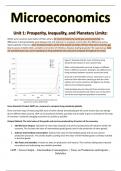Week 6: International Organization 1-2
Lecture 11 – Private military and security companies
Lecture (p. 2-5)
Readings (p. 6-10)
Bures – Private Military Companies: A Second-Best Peacekeeping Option?
Avant – Private security companies
Lecture 12 – Global environmental governance
Lecture (p. 11-12)
Readings (p. 13-18)
Gutner – Chapter 6: World Bank case study - Environmental behaviour and
performance
Biermann & Pattberg – Global Environmental Governance: Taking Stock,
Moving Forward
1
,International Organization 1 & 2 International Organization and International Relations
Week 6 – Lecture 11: Private military and security companies
Lecture
Useful terms
- Private military firms: corporate bodies that specialize in the provision of military skills to clients
- Private security firms: corporate bodies that specialise in the provision of protection services to
clients
-> the line between is very blurry: distinction much easier made in theory/analytically, than in reality
- Mercenary: ‘illegitimate’ soldier of fortune, an outsider fighting for profit in a conflict
- Private security/military contractor: ‘legitimate’ employee of PMSC
History of PMSCs
- History of sovereign use of mercenaries stretches back millennia, before state power and force
- 1648 Treaties of Westphalia reduces, but does not eliminate, market demand for violence (e.g.
army ‘rental’ between friendly states, chartered companies in 17/18 th C.)
- By 20th C., state control (‘monopoly of violence’) over violence institutionalised but market for
private military services remains
- 1990s: significant growth in PMSC industry, as end of cold war creates new supply (military armies
downsized -> soldiers without a job but with skills could contribute to private and military security
armies) and demand (many small wars, for which they employed private armies)
- Today: one of the world’s biggest industries, with increasingly broad range of services offered
Services provided by PMSCs
- Provide services to states, businesses, MNCs, international organisations, NGOs, individuals and
others
- Military services can be divided into:
- Advice and training (e.g. reorganising force structure, tech adoption, mission planning,
soldier training)
- Logistical support (e.g. transport, food, telecoms, laundry, admin, construction)
- Operational support (e.g. ‘command and control’, weapons systems operations, armed
combat roles (relatively smart number of cases))
- PMSCs services overall can also be disaggregated into military and policing services (though the line
is blurry):
PMSCs and international organisations - Why do we talk about PMSCs in a lecture on IO?
- Often operate in same theatres as IOs (e.g. mercenaries in Siege of Jadotville, Executive Outcomes
(EO) in Sierra Leone and Angola, various US-contracted PMSCs in Iraq)
- Provide support to IOs in certain areas (e.g. Armorgroup in former Yugoslavia, Defence System Ltd
in DRC, Kwazulu Natal Security in East Timor)
- Some PMSCs are transitional IOs in their own right (e.g. G4S operations in 90 countries with over
570,000 employees)
, International Organization 1 & 2 International Organization and International Relations
- Regulation of PMCs can most feasibly be conducted through the framework of an IO (e.g. UN
Mercenary Convention)
PMSCs - Argument made in favour … (they are arguments, not universal facts)
- Easier to deploy than multilateral force: “gridlock” in the UNSC, no multilateral agreement needed
- Less political baggage than national armies: easier for a country to live with the death of a private
contractor than with the death of a national army soldier
- Better equipment, training and experience
- Willing to do jobs states/IOs are reluctant or unable to do: “they do not need to be convinced of the
rightness of what they should do; they should just be paid”
- Cheaper than national/UN forces
- More effective than national/UN forces
- Better human rights record overall than other armed groups in ‘failed’ states (Bures 2005): this goes
against the idea of “they do not need to be convinced of the rightness of what they should do; they
should just be paid”
PMSCs - Argument made against … (they are arguments, not universal facts)
- Less accountability in wars
- Privilege executives over legislatures (meaning it’s easier to initiate violent actions)
- Less transparency: they don’t have to release information (‘Freedom of Information Requests’, they
are not ‘FOI-able’)
- Involve unelected commercial interests in policy: profit is motivation, non-elected ‘officials’ which
would undermine democracy in a sense
- Give power over violence to non-state actors (e.g. MNCs, criminals, terrorist networks)
- Involvement in attempts to overthrow governments
- Undermine states: all of the above lead to the overarching argument that PMSCs undermine (the
legitimacy of) states
- Tool of neo-colonialism
Judging ‘good’ and ‘bad’ PMSCs
- Fitzsimmons argues many PMSCs in Iraq exhibited a moderate or high level of adherence to the jus
in bello principles of proportionality and discrimination
- Analysis of 12 PMSCs, involved in 1,853 violent incidents in Iraq from 2003 to 2009
- Akcinaroglu & Radziszewski (2013) argue competition and payment in extraction rights incentivised
PMSCs to reduce conflict duration
- Analysis of African civil wars between 1990 and 2008 suggests PMSC behaviour driven by
opportunity structure
PMSCs as peacekeepers
- PMSCs never used in peacekeeping combat roles, but have filled a wide range of support roles for
the UN
- 1994: Annan considers hiring PMSC to oversee refugee camps in Eastern Zaire
- 1996: UN DPKO considers hiring PMSC to quell violence and protect displaced people in Zaire
- 2003: GPSP proposal for non-profit, 5,000+ reserve of soldiers for UN use to quickly extinguish
‘brush fires’
- Bures (2005) argues in certain situations only ethical choice is to use PMSC (over non-action for
example), e.g. in the case of Rwanda:
PMSCs and the Rwandan genocide
- 1994: EO report claims firm could have significantly reduced scale of genocide, had they been hired
- On the ground within 14 days
- 1,500 personnel, with their own fire and air support, deployed within six weeks
3

